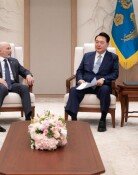No timeline on N. Korea’s denuclearization
No timeline on N. Korea’s denuclearization
Posted June. 27, 2018 07:43,
Updated June. 27, 2018 07:43
Fifteen days have passed since the June 12 North Korea-U.S. summit, but there have been no follow-up negotiations or denuclearization plans executed. Instead, U.S. Secretary of State Mike Pompeo said Monday that Washington would not put a timeline on the North’s denuclearization. He took a step back from his previous stance where he said he would like to see nuclear disarmament by 2020 when President Donald Trump’s term ends.
Two heads of state agreed to have a follow-up discussion soon in the joint statement in Singapore, but Pyongyang has been only showing conciliatory gestures such as repatriating remains of U.S. soldiers and still has not responded to Trump’s request to have another meeting. North Korea held a large-scale anti-U.S. rally every year from June 25 to July 27, from the day when the Korean War broke out to the day of ceasefire agreement. This year, however, mass protests or anti-American post stamps are nowhere to be seen. Trump was delighted to see North Korea take off anti-U.S. signs.
Many North Korea experts worried that Pyongyang would seek to improve its relations with the United States and ease sanctions by using one-off measures agreeable to the Trump administration and taking as much time as possible for denuclearization. There is a fat chance that China is encouraging North Korea to do so. Pompeo also seems to think North Korea’s lukewarm attitude is China’s influence, which probably is why he said he would keep an eye on China on a phone call with South Korean Foreign Affairs Minister Kang Kyung-hwa.
Nevertheless, South Korea has been adopting appeasing policies for the North. The two Koreas had a meeting on Tuesday and began working-level talks to connect railways. The South Korean Ministry of National Defense is showing signs of suspending K-9 live-fire artillery drills for defense of the northwestern islands including Yeonpyeong Island along with the Ulchi Freedom Guardian and Korean Marine Exchange Program. A series of military drills has been suspended. President Trump said Saturday that the South Korea-U.S. joint military drills were “provocative” and launching U.S. bombers during the drill was “crazy.”
Fortunately, many in the Trump administration and Congress recognize the importance of the South Korea-U.S. alliance, which means Trump cannot rule the roast over the defense posture of the alliance. It will not be easy for North Korea to revert back to its old tactics as Washington is vigilant on Pyongyang’s strategies to turn denuclearization into nuclear disarmament talks between nuclear states by taking as much time as possible. South Korea needs to make efforts to encourage the North to phase out its nuclear programs while fostering peace and reconciliation on the Korean Peninsula. If Seoul neglects denuclearization by focusing only on peace and reconciliation, it would have to deal with a nuclear state connived by the global community.







